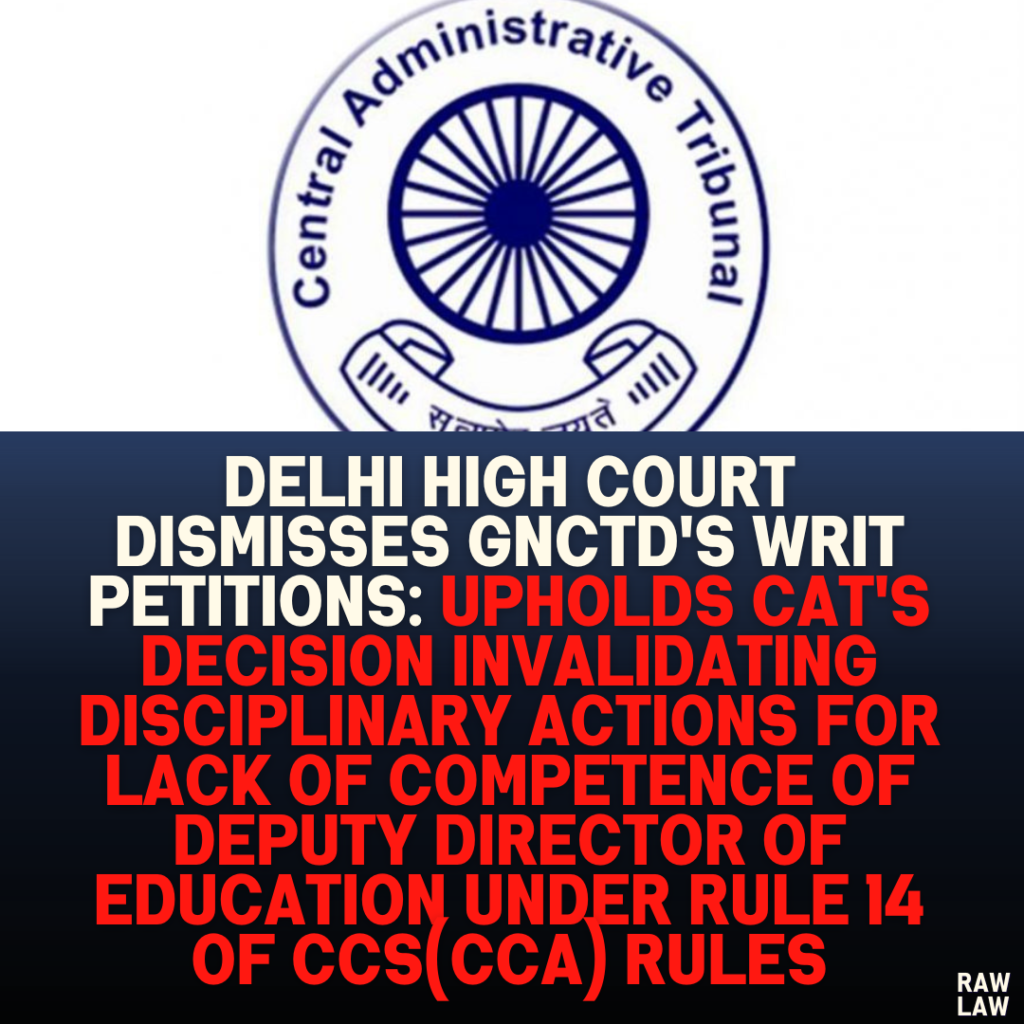Court’s Decision
The Delhi High Court dismissed two writ petitions filed by the Government of NCT of Delhi (GNCTD). These petitions challenged a Central Administrative Tribunal (CAT) decision that found the Deputy Director of Education (DDE) incompetent to act as the Disciplinary Authority (DA) under the Central Civil Services (Classification, Control and Appeal) Rules, 1965 (CCS(CCA) Rules). The court emphasized judicial consistency and applied its earlier ruling in a similar case involving another teacher, Udal Singh, to arrive at its decision.
Facts
- Employment Background:
The respondents in the case were Trained Graduate Teachers (TGTs) working under the Directorate of Education (DOE), Delhi. - Disciplinary Proceedings:
- Charge sheets were issued to the respondents under Rule 14 of the CCS(CCA) Rules, alleging misconduct.
- The Deputy Director of Education (DDE) initiated disciplinary inquiries against the respondents.
- The inquiries resulted in a penalty: a reduction in pay by three stages until retirement.
- The appellate authority, Secretary (Education), reduced this penalty to a reduction in pay by one stage until retirement.
- Challenge Before CAT:
The respondents, along with another teacher, Udal Singh, approached the Central Administrative Tribunal (CAT), arguing that the DDE was not authorized under the CCS(CCA) Rules to act as the Disciplinary Authority (DA). - Tribunal’s Ruling:
- The CAT held that the DDE did not have the statutory authority to act as the DA.
- Consequently, it set aside the disciplinary actions against the respondents.
- Current Writ Petitions:
- GNCTD challenged the CAT’s decision in the High Court.
- Notably, a separate petition involving Udal Singh had already been dismissed by the High Court on similar grounds.
Issues
- Was the Deputy Director of Education competent to act as the Disciplinary Authority under the CCS(CCA) Rules?
- Should the current petitions be treated differently from the previously dismissed petition involving Udal Singh, despite identical circumstances?
Petitioner’s Arguments
- GNCTD contended that the disciplinary actions initiated by the DDE were valid.
- Counsel for the GNCTD attempted to distinguish the current cases from the earlier judgment involving Udal Singh.
Respondent’s Arguments
- The respondents maintained that the DDE lacked the statutory authority under the CCS(CCA) Rules to act as the Disciplinary Authority.
- They argued that the CAT’s ruling was legally correct and binding.
Analysis of the Law
- Rule 14 of the CCS(CCA) Rules: This rule governs the initiation and conduct of disciplinary proceedings against government employees. It specifies the competent authority authorized to initiate and impose penalties.
- The CAT interpreted Rule 14 strictly, determining that the DDE did not qualify as the Disciplinary Authority for the respondents.
- The High Court agreed with this interpretation, noting that the delegation of authority must comply with statutory provisions.
Precedent Analysis
- Case of Udal Singh:
- In a similar case, Udal Singh, a TGT, faced identical disciplinary actions initiated by the DDE.
- The CAT’s judgment in Udal Singh was identical to its judgment in the present cases.
- The High Court had dismissed GNCTD’s writ petition against the CAT’s ruling in Udal Singh’s case.
- This precedent was binding and applied to the current petitions.
Court’s Reasoning
- Identical Circumstances:
- The respondents’ cases were factually and legally identical to that of Udal Singh.
- The same Tribunal decision was under challenge, and the same legal issue was raised.
- Consistency in Judicial Decisions:
- The court emphasized the importance of consistency, stating that it could not depart from its earlier decision in Udal Singh without a valid basis.
- GNCTD’s counsel failed to present any distinguishing factors.
- Reaffirmation of CAT’s Decision:
- The High Court agreed with the CAT’s interpretation that the DDE lacked competence to act as the DA under Rule 14 of the CCS(CCA) Rules.
Conclusion
The High Court dismissed the writ petitions filed by GNCTD. It upheld the CAT’s ruling that the disciplinary actions initiated by the DDE were invalid due to lack of authority. The court imposed no costs on the parties.
Implications
- Consistency in Application of Precedents:
- The judgment underscores the judiciary’s commitment to consistency in decision-making.
- It reinforces the principle that similarly situated cases should be treated alike to ensure fairness and predictability in the law.
- Strict Adherence to Statutory Framework:
- Government authorities must ensure that disciplinary proceedings comply strictly with statutory rules.
- Unauthorized actions by disciplinary authorities can lead to invalidation of entire proceedings, as seen in this case.
- Guidance for Future Cases:
- The ruling sets a precedent for similar disputes involving the competence of disciplinary authorities under the CCS(CCA) Rules.



